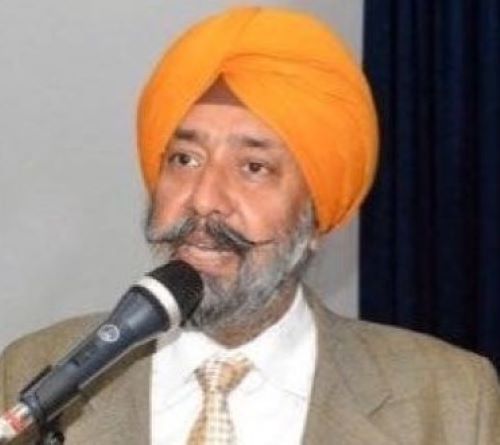 The split within the Shiromani Akali Dal is, for all practical purposes, complete. On one side stands Sukhbir Singh Badal, armed with financial resources, entrenched networks, and the institutional backing of the Shiromani Gurdwara Parbandhak Committee (SGPC). On the other, Giani Harpreet Singh, the former Jathedar of Takht Damdama Sahib, now helms a new Shiromani Akali Dal that aspires to redefine Panthic politics. Both leaders have been visibly active in the flood-affected areas, but while the Badal group seeks political dividends from SGPC-led relief, public opinion increasingly stresses that these are Sangat’s funds, not personal largesse.
The split within the Shiromani Akali Dal is, for all practical purposes, complete. On one side stands Sukhbir Singh Badal, armed with financial resources, entrenched networks, and the institutional backing of the Shiromani Gurdwara Parbandhak Committee (SGPC). On the other, Giani Harpreet Singh, the former Jathedar of Takht Damdama Sahib, now helms a new Shiromani Akali Dal that aspires to redefine Panthic politics. Both leaders have been visibly active in the flood-affected areas, but while the Badal group seeks political dividends from SGPC-led relief, public opinion increasingly stresses that these are Sangat’s funds, not personal largesse.
The Problem of Representation
The SGPC—often described as the mini-parliament of the Sikhs—last went to polls in 2011. Its five-year mandate expired long ago. Since then, new generations of Sikh youth who have attained the qualifying age of 21 under the Sikh Gurdwaras Act have been denied their franchise. The continued functioning of the SGPC without fresh elections renders it non-representative in both legal and moral terms. This is the biggest institutional weakness in Panthic governance today.
Why Giani Harpreet Singh Matters
The new Shiromani Akali Dal under Giani Harpreet Singh has the advantage of moral credibility and fresh energy. But moral credibility alone is insufficient. Unless translated into actionable institutional reforms and broader regional outreach, the movement risks becoming another faction rather than a transformative alternative. This is where the new leadership must be both pragmatic and visionary.

Karan Bir Singh Sidhu, IAS (Retd.), former Special Chief Secretary, Punjab, writes on the intersection of constitutional probity, due process, and democratic supremacy.
My Specific Suggestions
1. Hold Early SGPC Elections
Fresh elections to the SGPC should be demanded and facilitated at the earliest. Representation cannot be indefinitely postponed. The call for elections should be backed by a transparent and statutory election calendar.
2. Appoint an Impartial Chief Commissioner
An independent, retired Gursikh judge of the Punjab & Haryana High Court should be appointed as Chief Commissioner of Gurdwara Elections to ensure fairness and credibility.
3. Finalise Electoral Rolls Without Delay
Voter lists must be compiled and finalised swiftly. Electoral justice delayed is justice denied, especially when an entire generation of Sikh youth has been disenfranchised.
4. Reconstitute a Representative SGPC
The new SGPC must reflect today’s Sikh community. Current SGPC members, whose mandate has lapsed, should be publicly urged to resign in good faith, acknowledging that their legitimacy is exhausted.
5. Clarify Sahajdhari Voting Rights
A clear and final settlement on the voting rights of Sahajdhari Sikhs is essential. Pending litigation must be expedited, and the Government of India should issue clarificatory notifications to remove all ambiguity.
6. Affirm the Kirpan as a Fundamental Right
The new party should educate and encourage Sikh youth, both men and women, to embrace the kirpan as a constitutionally protected article of faith under Article 25, irrespective of Amritdhari status.
7. Operationalise the Anand Marriage Act Nationwide
The Anand Marriage (Amendment) Act must be implemented uniformly across all States and Union Territories, so that Sikh marriages are registered under their own statute without bureaucratic hurdles.
8. Codify Rules for Jathedars
The qualifications, appointment, tenure, transfer, and removal of Takht Jathedars must be codified in statutory rules to prevent arbitrary political interference. Fixed tenure, due process in removal, and a transparent appointment mechanism are essential to protect the sanctity of Panthic institutions.
9. Publish a Time-Bound Election Calendar
The new leadership should insist that within 30 days a complete SGPC election calendar be published, including dates for draft rolls, objections, nominations, polling, and counting, with neutral observers to guarantee transparency.
Beyond Panthic Issues
For the new Shiromani Akali Dal to be genuinely effective, it must broaden its agenda beyond Panthic concerns. Punjab today requires a regional party that champions the rights of all Punjabis—Sikh and Hindu youth, landless labourers, women, ex-servicemen, and micro-entrepreneurs. Only a party that speaks to the wider Punjabi social fabric can hope to engage with the Union Government as an equal stakeholder rather than from a position of subservience.
Ultimately, Panthic legitimacy must translate into Punjabi empowerment. That is the path forward for the new Shiromani Akali Dal.